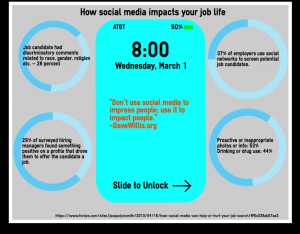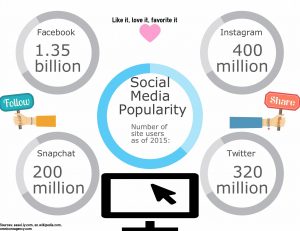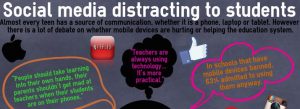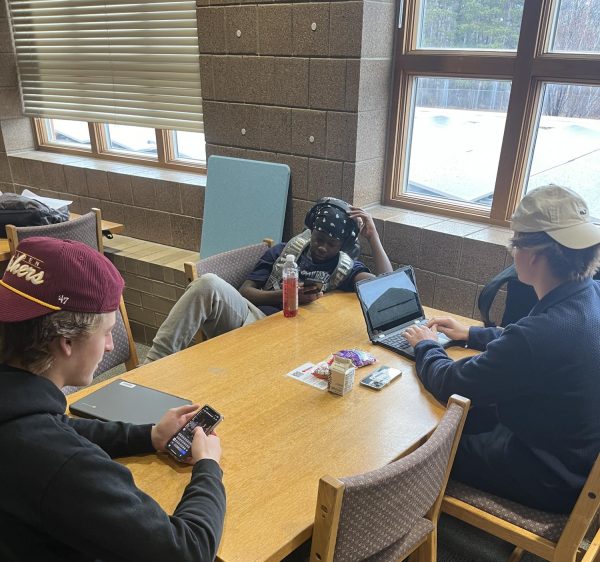Social media, love it or leave it
Social media is becoming a crisis regarding communication between all ages. This issue has greatly impacted the lives of people around the world due to their constant need to be up to date with current events. This ongoing issue has been creating an uproar. People use social media to spread ridiculous amounts of lies, threats and negativity in general, while reducing social skills and self esteem.
People all around the world are using their phones more than interacting with people face to face. They are so focused on being up to date with current things that they seem to be shutting out the world around them. They may be up to date with current news in their community, but the result of constantly being on social media is they may not be up to date with news in their family and friend groups.
“It decreases social skills. People are so addicted to the point where social media is all they know,” senior Maeve Caswell said.
Social media has caused an epidemic of people being attached to their phones. A game has been created. People are trying to be up to date and in the know of the latest trends, news, gossip, political news, sports, the list goes on. People are isolating themselves while the world goes on around them. This will continue to dehumanize people until the issue is addressed. According to Pew Research Center “smartphone users – particularly younger adults, minorities and lower income Americans – depend on their smartphones for internet access.”
“I think it is an issue, people always look at their phones and they run into people in the hallways,” freshman Zach Coyle said.
The distractions do not stop there. People all around us use their phones while walking in the halls, on the street, in stores and even while driving. For some, this may cause minor injuries such as innocently being run into in the hall or on the street. For others, people lose their lives due to inconsiderate people using their phones while driving. There is documentation of fatal car accidents that happen every year due to distracted drivers being on their phones. The Federal Communications Commission stated that “at any given daylight moment across America, approximately 660,000 drivers are using cell phones or manipulating electronic devices while driving, a number that has held steady since 2010.”
“You don’t always get the same contact and might take thing out of context. You might interpret it differently. You can’t see facial expressions,” junior Miah Janisch said.
Social media offers things like emojis to show how a person is feeling, but the recipient of the message may not know what the real feeling of the message is. Although emojis may be an attempt to put life back into a person’s message, the emotion may not be genuine. With face to face communication, we are able to see how a person is reacting to the conversation that is taking place. Face to face communication offers a more genuine, heartfelt conversation.
“People think things that aren’t true. People are just now recognizing this and we can change it by putting an age restriction on social media and try to limit phone use,” freshman Chance Atkinson said.
Many adults comment on the excessive phone use of teenagers and young adults. They stress the fact that the world is going on around them while they are attached to a cell phone or social media. This is an issue that can easily be solved. Phone use at school has been limited in recent years and students do not seem to know why. Phones are commonly being revoked if a student is on their phone while a lesson is going on. Somehow, they think that what they post on Instagram or who is Snapchatting them is more important than their education.
Social media is compelling and has created plenty of obstacles in recent years. Limiting phone use is a way to prevent things like fatal car accidents, a decline in someone’s education, someone being run into in the halls, or someone simply lacking the emotion and facial expressions that a face to face conversation would have. Completely cutting off social media may not be an answer, but self monitoring might be a step in the right direction.

Rachel Dankers, junior, is a Layout Editor for the Pony Express. She writes for the Editorial department. Rachel enjoys hiking and kayaking in her free...













Madison Weispfenning • Nov 13, 2017 at 5:39 pm
As I was reading I was noticing myself thinking of ways that I can limit myself and on when do I and don’t I need my phone. Your writing technique really makes people take a second look at reality. I love it. I do, although, wish that you can include more positive aspects of phones.
Ellie Faeth • Nov 12, 2017 at 4:46 pm
This article makes a person really think about their social media usage; the facts and quotes from students help to put this idea into perspective. There is also a great range of ages and genders of students! Nice job on that. This article is very important for people to read.
Chloe Squires • Oct 27, 2017 at 11:28 pm
I clicked on this article because of the fun title and because I can relate to the topic. I was drawn in because of the details; I really enjoyed the fact from the Federal Communications Commission. Well done!